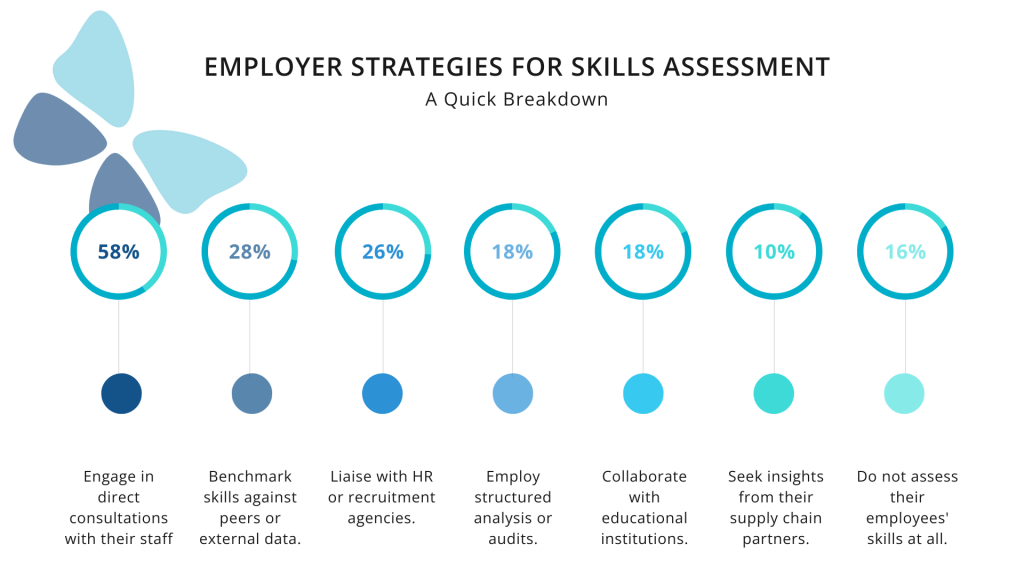The rapid digitalisation of industries across the UK has ushered in a new era of technological advancement. Yet, this progress has been met with a significant challenge: a widening skills gap. This article delves deep into the latest data, reports, and statistics to shed light on the magnitude of this issue and its implications for businesses and employees alike.
Understanding The UK Skills Gap
At its core, the skills gap represents the disparity between the skills required for a specific job role and the actual competencies of an employee or job applicant. Current research indicates that approximately 40% of the UK’s workforce is either underqualified or overqualified for their roles. Alarmingly, projections suggest that by 2030, nearly 20% of the workforce, or around 6.5 million individuals, will be significantly underskilled for their positions.
Basic Statistics
- By 2030, an estimated 20% of the UK workforce, equating to roughly 6.5 million individuals, will be significantly underskilled for their roles.
- 27% of UK workers report a deficiency in the digital skills necessary for their job.
- A staggering 58% of employees reveal that their employers have never offered training to enhance their digital competencies.
- 58% of workers believe that their lack of digital skills has adversely impacted their professional performance.
- A significant 66% of large UK enterprises face challenges in recruiting skilled employees.
- The UK government identifies engineering, software development, and architecture as highly sought-after skills.
- A whopping 92% of businesses emphasise the importance of basic digital skills for their workforce.
Recent studies have highlighted that 88% of all UK businesses, translating to 244,000 companies, experience a shortfall in at least one digital skill domain within their teams. In a 2020 survey, 69% of business leaders acknowledged the presence of a skills gap among their employees. The data further reveals that 23% of employees lack foundational digital skills, while 37% are devoid of advanced digital competencies. Moreover, 21% of young individuals from socio-economically disadvantaged backgrounds do not have access to essential digital devices.
Root Causes Of The Skills Gap
Several factors contribute to the prevailing skills gap in the UK:
- Digitalisation Surge: The shift towards digital operations has left workers needing the requisite tech skills trailing.
- Brexit Aftermath: The UK’s exit from the EU reduced the influx of European workers, leading to labour shortages in sectors like hospitality, healthcare, and corporate support services.
- COVID-19 Pandemic: The pandemic-induced shift to remote working and digital platforms, coupled with job losses, accentuated the skills gap. Moreover, businesses prioritising survival often sidelined employee training.
- Inequality: Socio-economic disparities have rendered young individuals from disadvantaged backgrounds without access to digital resources, hindering their skill development.
Industries Grappling With The Skills Gap
Several sectors are feeling the pinch of the skills gap:
- Manufacturing: 80% of employers in this sector struggle to find skilled candidates, especially in areas like automation, robotics, and IoT.
- Software: The pandemic heightened the demand for robust software solutions. Software development emerged as a top skill in 2020, with demand outpacing supply.
- Business and Finance: Skills like stakeholder management, commercial acumen, and influencing are in short supply, with 60% of CFOs facing recruitment challenges.
- Engineering: With 20% of engineers set to retire by 2026 and technological advancements, there’s a looming skills crisis. The UK needs an estimated 186,000 engineers annually until 2024.
- Digital: While tech roles face their own skills shortage, digital competencies are universally essential across industries.
The Role Of Employers
Employers play a pivotal role in shaping the skills landscape. Data suggests a disconnect between what senior executives deem essential and their recruitment priorities. For instance, while 92% of hiring managers value the ability to influence and inspire, only 33% actively seek this during recruitment. This misalignment necessitates a recalibration of hiring processes to align with business needs and reduce employee turnover.

A survey on UK employers’ strategies for skills assessment yielded the following insights:
- 58% engage in direct consultations with their staff.
- 28% benchmark skills against peers or external data.
- 26% liaise with HR or recruitment agencies.
- 18% employ structured analysis or audits.
- 18% collaborate with educational institutions.
- 10% seek insights from their supply chain partners.
- Alarmingly, 16% do not assess their employees’ skills at all.
Skills assessments are tests that employers use to measure the abilities of job candidates and current employees. These tests can evaluate both hard skills (such as coding, typing, or language skills) and soft skills (such as communication, teamwork, and problem-solving). The purpose of skill assessments is not to determine knowledge of a specific subject, but to assess the candidate’s practical skill level. Employers can use skill assessments to narrow down candidates during the hiring process or to evaluate current employees’ skills.
It’s surprising to see that 16% of employers don’t assess their candidates for skills or analyse the skills required for the job. Having a clear understanding of the necessary skillsets is crucial for any organisation to know if they have any skills gap.
Skill assessments are a vital part of creating a productive and effective workplace. By testing the necessary skills for the job, employers can ensure that they’re hiring the candidates best suited for the role. However, for a truly objective approach, these assessments need to be handled with the right tools and strategies. Using objective skill assessments, hiring teams can remove bias from the hiring process and create a fair, inclusive, and equitable interview experience for every candidate, every time.
Addressing The Digital Skills Gap
Employers are adopting various strategies to bridge the skills gap:
- 47% offer on-the-job digital training.
- 33% recruit skilled talent.
- 23% facilitate external digital training.
- 16% partner with local training providers.
- However, 11% take no action to address the skills deficit.
Many employers are struggling to fill the digital skills gap in their workforce. The challenge seems to be more acute for advanced digital skills, with 41% of employers reporting difficulty in recruiting workers with such skills as compared to 24% struggling to find employees with basic digital skills. The figure above shows that employers are most likely to address the skills gap by providing on-the-job digital skills training (47%) and recruiting workers with the required skills.

Suggestions For Hiring Managers
Invest in Training and Development
Many companies, including BT, have made significant investments in retraining their workforce to ensure they possess the necessary skills for the digital age. As a member of the HR team, your organisation should consider providing regular training sessions, workshops, and courses to aid employees in upskilling and reskilling.
Broaden Recruitment Strategies
Rolls-Royce, a multinational engineering company, has established partnerships with local colleges to create apprenticeship programs that offer practical training for students. You may consider following a similar approach by collaborating with educational institutions, attending job fairs, and exploring non-traditional hiring sources such as boot camps or online courses.
Rethink Job Requirements
It has become a common practice for big companies such as HSBC to evaluate job candidates based on their skills and potential, rather than just their degrees. This shift in approach enables companies to focus on transferable skills and the ability to learn, rather than narrow qualifications. As a result, this approach can widen the talent pool and attract more diverse candidates.
Offer Competitive Benefits and Flexibility
In order to attract top talent, companies such as ARM and DeepMind offer a range of benefits including free meals, hybrid working, gym memberships, and flexible work schedules. It is important to understand the benefits that potential candidates value the most and offer them accordingly to make your company more appealing.
Foster a Culture of Continuous Learning
Encouraging employees to take ownership of their learning, providing them with adequate resources, and rewarding those who actively seek to improve their skills is crucial for a company’s success. For instance, Barclays established Barclays University, a learning and leadership development centre, which has proven to be highly beneficial. However, creating a university is not necessary as there are now numerous online courses and professional qualifications that team members can participate in to enhance their skills.
Engage with the Community
Partnering with local organisations such as schools and charities can create opportunities for potential candidates to acquire the necessary skills and become part of your organisation. For instance, John Lewis offers internship and training programs in collaboration with schools and charities, specifically targeting underrepresented groups.
Utilise Technology and Data
One effective way to find the top talent in the job market is by adopting new technology solutions that help in assessing candidates’ skills and attracting new talent. Several companies have implemented AI-driven platforms to accurately match the skills of candidates with job requirements, such as Github, which has used such platforms to find new talent.
By adopting these strategies, hiring managers can find suitable candidates for their current job openings and ensure their workforce is prepared for future challenges. Addressing the skills gap is not just about filling vacancies; it’s about future-proofing businesses and ensuring sustained growth and innovation.
In Conclusion
The skills gap is a pressing issue that many industries face, with a significant number of employers struggling to find candidates with the right skills for their job openings. This mismatch between the skills employers need and the skills job seekers possess can hinder business growth, innovation, and productivity. However, hiring managers can play a pivotal role in bridging this gap by adopting hiring best practices and encouraging resilience within the organisation.

References:
- Amazon – Digital Transformation Could Grow the UK Economy by Over 413 Billion by 2030 – https://www.aboutamazon.co.uk/news/aws/digital-transformation-could-grow-the-uk-economy-by-over-413-billion-by-2030
- Industrial Strategy Council – Skills Mismatch 2030 – https://industrialstrategycouncil.org/sites/default/files/UK%20Skills%20Mismatch%202030%20-%20Research%20Paper.pdf
- ONS – Job Vacancies in the UK – https://www.ons.gov.uk/employmentandlabourmarket/peopleinwork/employmentandemployeetypes/bulletins/jobsandvacanciesintheuk/may2022
- Migration Observatory – End of Free Movement Affecting the Low Wage Labour Force in the UK – https://migrationobservatory.ox.ac.uk/resources/reports/how-is-the-end-of-free-movement-affecting-the-low-wage-labour-force-in-the-uk/
- Avado Learning – Bridging the Skills Gap for UK Businesses – https://www.avadolearning.com/press/beyond-skills-capabilities-could-bridge-the-skills-gap-for-uk-business/
- World Skills – Disconnected Report – https://www.worldskillsuk.org/wp-content/uploads/2021/03/Disconnected-Report-final.pdf
- Iungo Solutions – 7 Industries Addressing the Skills Gap – https://iungo.solutions/7-industries-looking-to-address-the-skills-gap/
- British Chambers – Business Barometer Report – https://www.britishchambers.org.uk/media/get/The%20Open%20University%20Business%20Barometer%202022%20report.pdf
- Engineering Construction Industry Training Board – https://committees.parliament.uk/writtenevidence/111345/pdf/
- Monster – Flexible Future UK Hiring – https://www.monster.co.uk/advertise-a-job/resources/market-intelligence/ebooks-reports/flexible-future-uk-hiring-outlook-2022/
- UK Gov – Employer Demand for Digital Skills – https://assets.publishing.service.gov.uk/government/uploads/system/uploads/attachment_data/file/807830/No_Longer_Optional_Employer_Demand_for_Digital_Skills.pdf
- AND Digital – Skills Gap Report – https://www.and.digital/





